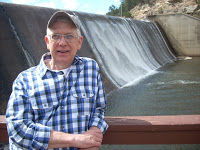This weekend while at a bar I saw an extreme sport on TV. Ice skaters raced at absurdly high speeds on a down-hill ice-covered course with sharp corners and jumps. “Absolutely foolish,” was my thought. I feel the same way about climbing high mountains, scaling rocks, deep sea diving, riding down white-water rivers in kayaks, on and on—all challenges of the hardy-body and hardly-wise from my scaredy-cat point of view.
Still, a realistic review of all sports-like extremes in my life sees me canoeing over a waterfall, but that was accidental, certainly not my intention, and I’ve already told that story. Such a review also sees me riding down a road on a snow mobile towards a big white-face bull, but I was not the driver, just a rider involved in that accident. The bull lowered its head and stopped us cold. I recall lying there in the snow unable to move thinking, “And now the bull is going to come over to trample and gore me.” I felt like a goner. I never expected that sport to become so extreme as to cause a number of trips to a physician and years of pain. But really my list of such extremities is short. I’ve already told these stories. I really don’t do anything extreme except sometimes entertain strange and extreme thoughts.
The things I have consistently done that are closest to extreme sports include some extreme reading and a few encounters with what seemed to me extreme piano pieces. For instance, in undergraduate school and in graduate seminary I read several New Testament books—the Gospels of Mark and John, and the first letter of Paul to the Corinthians. What made the readings extreme was that the text I read was in Greek! Fortunately I benefitted from the tutelage of fine professors of the language. In undergraduate school, on my own and without a teacher, I read in English Tolstoy’s War and Peace with its long Russian names and rather philosophical essays. I read the first volume in a month, took a month off, and then read the second volume. I recall almost none of the story and certainly not even one name except the author’s. You see, I don’t claim to be good at my extreme reading sport. I just engage in it.
Out of personal interest I read Victor Frankel’s classic Man’s Search for Meaning, the most difficult book I had read up to that time. I did not undertake practicing his logotherapy, not even on myself, but I do still recall one story he included and at least one general premise. More recently I read My Queer War by James Lord, a non-fiction account of Lord’s participation in the US Army during the European conquest. The story was not so challenging except in this reader’s ability to have faith in any military operation, but the main challenge was the author’s vocabulary, which led me to reread the book, list and look up all the difficult words I couldn’t readily define, and send the list to a friend who I knew would appreciate my making the list and why. I will mention that I have read books, many of them frankly, that have been a challenge in their stories, the scenes portrayed, and the values proffered, after all, I’ve been an avid reader of novels since I was in eighth grade and have read non-fiction endlessly, especially in anthropology, theology, music history, philosophy, sexology, and any number of specialized topics of my current interests. As a result I’ve stumbled through genetics while understanding only the barest of its meanings, philosophical abstractions that left me clueless, and logical conclusions that ran counter to my grasp of what the author had been saying all along. I’ve sometimes felt as if I were falling off a cliff, crashing into barriers, or caught in an avalanche. Oh well, I suppose I’m just being dramatic. Still, I remind myself of a couple of years in my thirties when I read at least five books a week, a practice that eventuated in my going on a book fast for a year.
During that year I attached myself to a piano teacher who liked my musicality and determined to teach me musicianship. Thus, using all my forsaken reading time to practice, I learned to play and memorized a number of extreme piano pieces, for instance, a Capriccio by Brahms, a prelude by Shostakovich, a short dance by Bartok, and several three-part inventions by Bach, and I played them in juries and music contests. Although I embarrassed myself in performance, I did love the challenges of the music. I also marveled at the real talent and technique of many accomplished pianists who, while they may have found the same pieces challenging, could actually play them in public with confidence and pride.
In short, for me extreme sports seem more based on their potential source of extreme embarrassment rather on my extreme coordination and ability. Thus while I have operated effectively within a limited field, I have risked only in order to participate in rather safe activities which have served to satisfy my almost missing need for adrenaline rushes. So while I accept that some folk may need to risk even their lives or to give everything in the development of a skill or to compete all their lives long, those conditions have had little appeal for me and have no real place in my life. I admire what it takes to do extreme sports, but at some very basic level I fail to relate to it. I don’t need to climb high mountains, don’t need to win in the race, don’t need somehow to be the best or to live on the edge of physical annihilation in order to be happy. Not me.
Denver, © 2013
About the Author
He also blogs at artandmorebyphilhoyle.blogspot
